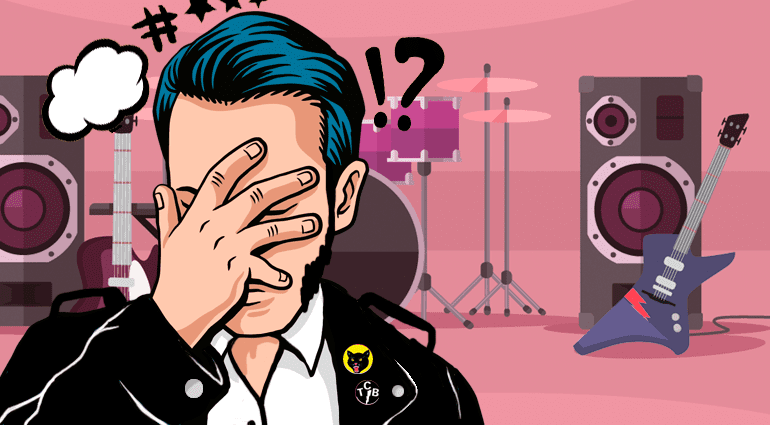
The player of strings, the guitarist, is often bombarded, by his band mates or sound engineers, with many remarks that put him/her down or make him/her question his/her abilities. It’s only logical, the guitarist is often times also the leader or is placed in the stage’s spotlight and therefore prone to attention and criticism. Guitarists are often surrounded by stereotypes and band mates often compete for status and the title of “Stage Hero”. Here are some recurring remarks that guitarists have to put up with over and over…
1. “You’re playing too loud!”

Guitar, especially electric guitar, is not know for it’s soft and restrained vibration of strings. Why? Because the guitarist is one of the supporting pillars of a band and has been throughout rock ‘n’ roll history. Between deep bass and heavy drums the guitar’s sound can get lost, unless it’s fed through a warm and assertive tube amp and the pre-amp is driven to the limit! No, you don’t need to go that far! This will only result in “volume wars” and all the band mates losing their hearing. You need to make a volume compromise and consider EQing your amp rather than cranking up the volume. Proper EQing can make your guitar stand out within the frequency range of your band’s collective sound.
2. “Less effects, please!”
The conversation between the sound technician and the guitarist is always the same: “Your sound is too muddy, less effects!” You have worked so hard at home, on your practice amp, to perfect the balance of effects and it sounds absolutely beautiful. Tasteful hall reverb, chorus, flanger and the whole shebang. In the rehearsal room or on a small stage without a PA system, this could work, just like at home. But as soon as you plug into the larger stage boards, it’s another story. Reducing your spatial effects is the art. You will have to trust the sound technician’s advice in these settings.
3. “You’re completely out of tune!”
You just nailed the perfect solo, even better than the way you practiced it. It’s a miracle that your fingers didn’t cramp up or fall off during all those hammer-ons, pull-off, tapping and sweeping! You used every trick in your arsenal. But when you finish and you look at the faces around you, no one seems impressed. “You’re way out of tune, man!”, someone finally admits. That’s the last thing you wanted to hear.
4. “Listen to the original”
You’re practising a cover song that is a must for the next show. The rhythm you play is exactly the same as on the recording but you find the original guitarist’s style to be a bit uninspired so you add more 8th notes, and during the chorus, even some 16th notes. During the lead part, you’ll show the crowd what tricks you have up your sleeve! It will still sound purely like the original and have the same effect, even more effect with your “improvements”. The reaction you get is: “Listen to the original again.” Nobody’s saying that it was complete rubbish, but they aren’t saying it was better than the original either. Remember that you are playing someone else’s song and the audience might have certain expectations, especially for subtleties, which you don’t want to drown out with extravagances.
5. “I know this song!”
You stayed up late last night, for numerous hours you were lost in creative thought and you composed a new song on your axe. You’re playing it gracefully and already imagining the bass line and the groove of the drums. The following day you’re ready for the next step and you show it to the band during rehearsal. You barely play five bars when the bassist, with his encyclopedic musical knowledge, says quite bluntly: “I know this song, it’s by so-and-so!”. Why does this always happen?! It seems like every chord progression has already been played somewhere at some time in history, by someone, in some way! Time to start learning jazz chords maybe?
6. “Your guitar always sounds the same!”
You have put together different guitar sound banks: Clean, overdriven, distorted, some unique delay presets and even volume variations. Then you go through the entire set list at rehearsal and someone complains that the guitar always has the same sound! You think: Firstly, they are not listening carefully enough, stringed instruments are about subtleties. Secondly, if it’s the same guitar and same fingers playing, the sound will have similarities from song to song. And thirdly, do the drums or the bass have different sounds for every song? Maybe for them they do (this could be a never-ending argument)! Remember: We tend to focus on the subtleties of our own creative efforts rather than on those of others.
7. “Can you offer something different?
You don’t often here this type of musician mumbo-jumbo unless you are in the recording studio. You rehearse a new title, you play what comes naturally to your mind and your fingers. It wasn’t perfect, but musicians rarely expect the first take to be a keeper. And then immediately comes the question: “Can you offer something different?”. What does “offer” mean here? Is the guitarist a waiter offering a variety of dishes? Or maybe they are confusing you for a multiple choice survey where the positioning of your “x” was wrong. Others (outside of the studio) might find what you are going is great, also maybe terrible. But you are not “offering” anything to anyone as if you were the drink menu at The Ritz Hotel!
We are pretty certain that if you are a guitarist you have heard at least a few of these comments or questions. What other annoying remarks have you had to endure? We’d be happy to hear about them in the comments! ✍
7 comments
Leave a Reply
You are currently viewing a placeholder content from Facebook. To access the actual content, click the button below. Please note that doing so will share data with third-party providers.
More InformationYou are currently viewing a placeholder content from Instagram. To access the actual content, click the button below. Please note that doing so will share data with third-party providers.
More InformationYou are currently viewing a placeholder content from X. To access the actual content, click the button below. Please note that doing so will share data with third-party providers.
More Information








Pär Sjöberg says:
When I tell my brother, who plays the drums, about the serious matter of guitar equipment and its influence on music, he remarks: “The important thing with the guitar sound is that it should hiss and buzz,” and continues: “real pros can get good sound out of just any equipment”. ? However, you never know how much drum skins and cymbals matter for my dear brother ?.
Joe says:
> HAHAHA, Thanks for sharing Pär! That’s what I call selective listening! //Joe
Flemming Luniak says:
I’m a harmonicaplayer. I’ve played big venues. I get AirPlay on national radio.
Still I’m asked: Why don’t you play an instrument?
Joe says:
> Flemming,
Some people can be cruel. Don’t listen to them, the harmonica is an amazing instrument and requires lots of technique, feeling and musicality. But you already know that 🙂 //Joe
Peter R. says:
I am solo rock, blues, etc, harmonica, guitar & looper covers from all over the place. ” Why don’t I do my own music/ lyrics?” I do, but I do not get the responce of when I’m doing Zeplin or Hendrix, etc. I get big gigs and plenty of €€, but this question keeps coming back to me. Should I retire?
Gabby says:
Do what makes you happy. Play originals and covers. Some great bands do just that.
Gabby says:
8. “Play Free Bird!!!!!!!”
9. “who’s (Name of famous guitarist)?”